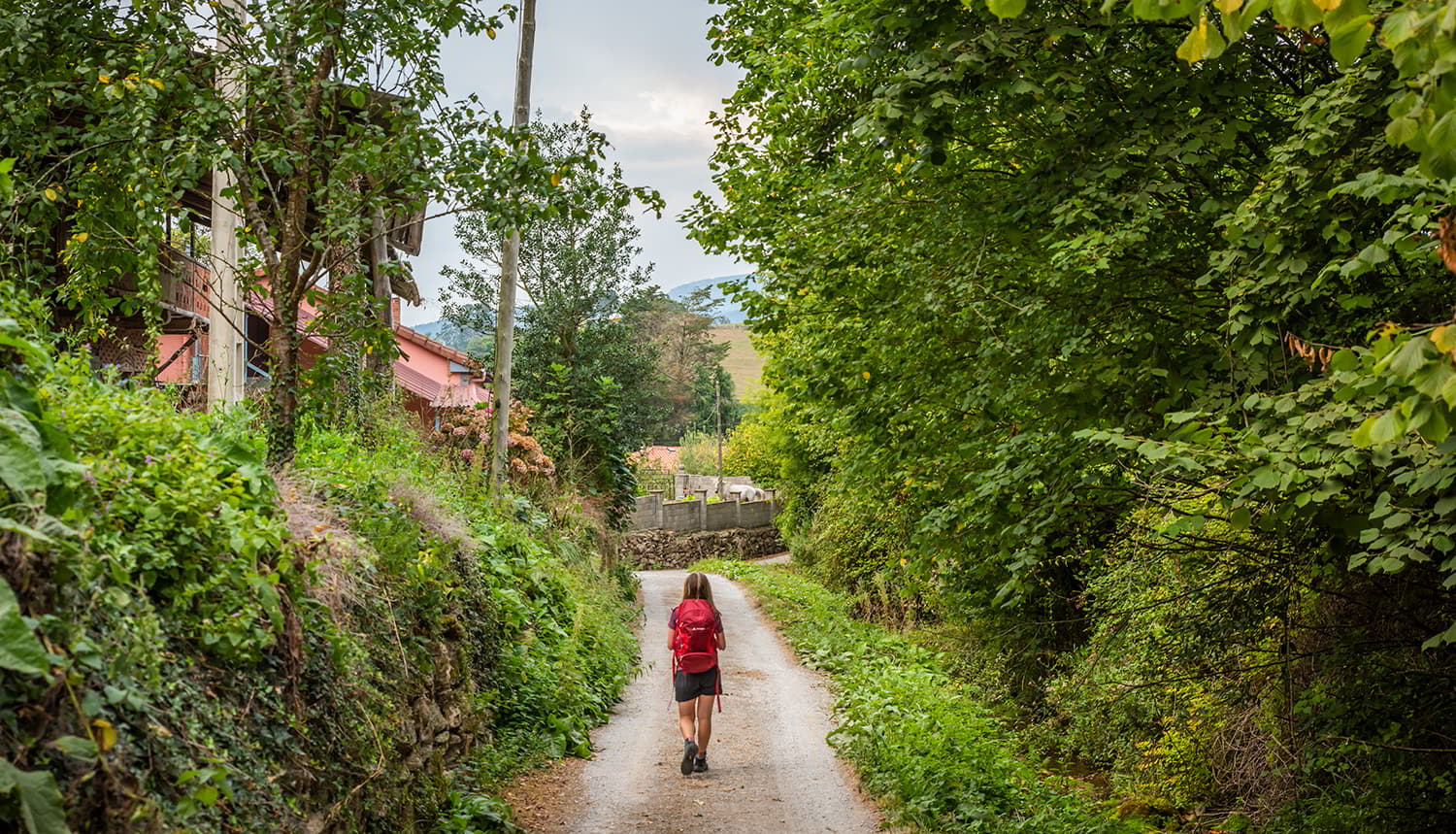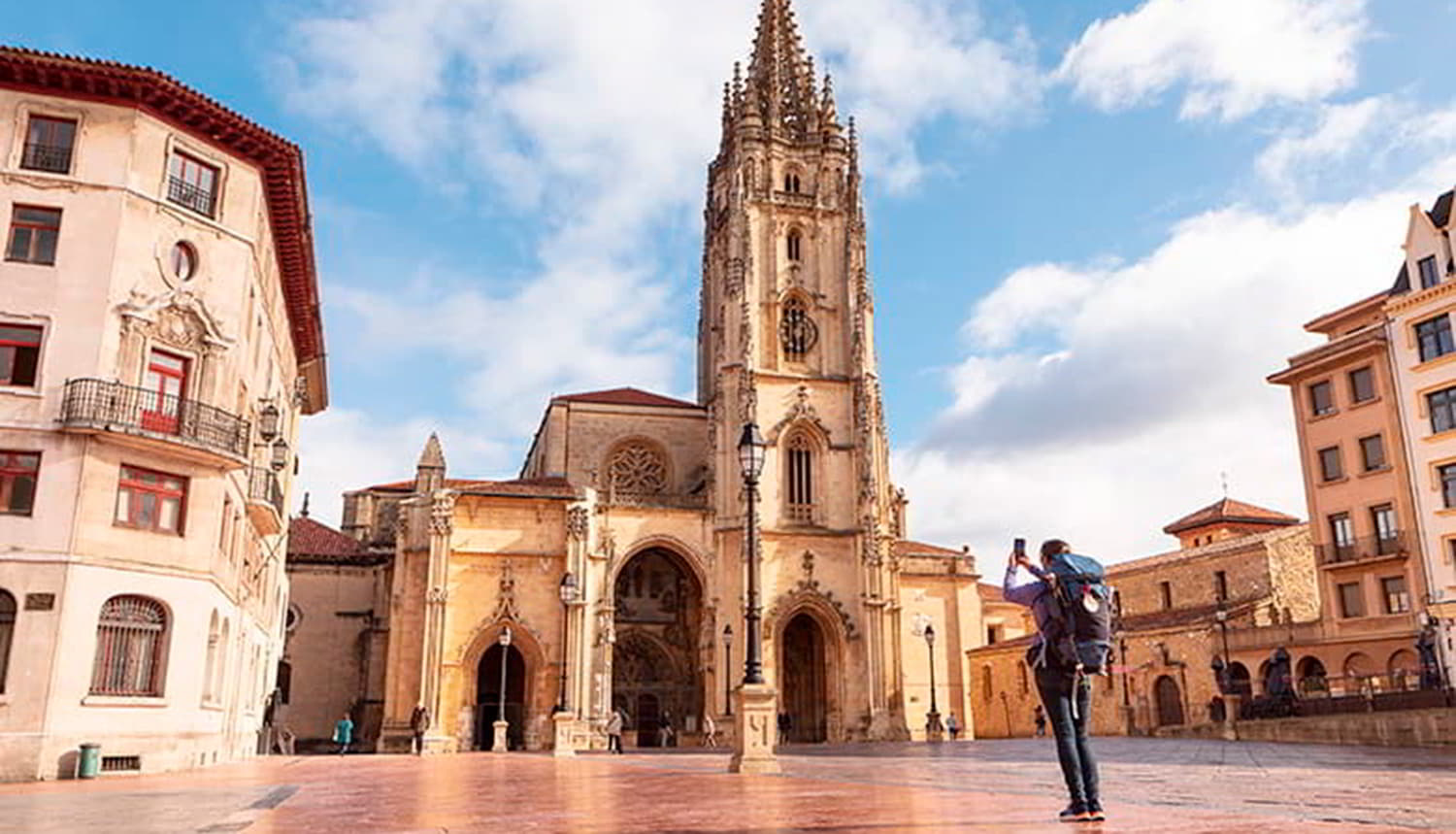Atrás Pasos que unen en el Camino de Santiago
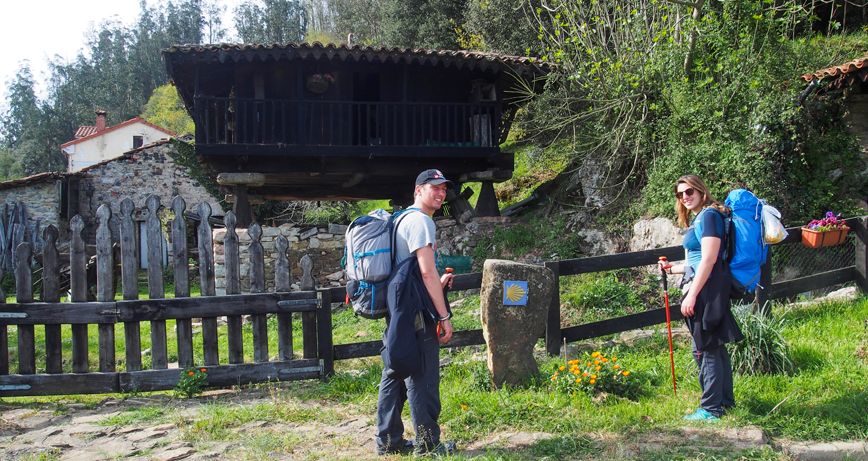
Pasos inolvidables que unen en el Camino de Santiago
El Camino de Santiago es un espacio de encuentro y amistad, de vivencias inolvidables que te marcarán para siempre. El escritor y viajero Miguel Barrero aporta su personal visión y experiencia como peregrino en el Camino Primitivo.
Me acuerdo a menudo de Joe Murdock. Fue una de las primeras personas con las que me encontré al empezar el Camino Primitivo, y la última con la que me crucé cuando tocaba terminarlo. Puede decirse que la nuestra fue una relación perfecta y circular: nos conocimos en el centro de Oviedo/Uviéu, al pie de un paso de cebra que cruzamos juntos para desembocar en el largo descenso de La Argañosa, y nos dijimos adiós en lo alto del Monte do Gozo, junto al conjunto escultórico que muestra el alborozo de dos peregrinos al distinguir, allá a lo lejos, las torres de la catedral compostelana.
Recuerdo las palabras que me dijo cuando, de manera un poco boba, los dos caímos en la cuenta de que era bastante improbable que nos volviéramos a encontrar en el futuro: «Nos tropezaremos algún día, caminando». Nos dimos un fuerte apretón de manos y luego nos abrazamos. Antes de perderlo de vista — yo había llegado a Santiago el día anterior y aquella visita al Monte do Gozo era un modo de contemplar con más detenimiento lo que las ansias por llegar a mi destino me impidieron observar con el detenimiento que merecía —, permanecí unos minutos contemplando su silueta descender por la ladera. Joe era un hombretón de Detroit que peregrinaba junto a su compañera Vivian. Creo que nos caímos bien porque los dos éramos poco habladores. Él apenas chapurreaba castellano y nos entendíamos en un inglés macarrónico que podía tomar préstamos lingüísticos verdaderamente exóticos. Dicen que las rutas jacobeas otorgan el don de las lenguas a quienes andan por ellas. A tenor de cómo congeniamos Joe y yo, puede que esa aseveración no sea ninguna tontería.

Dije que Joe fue una de las primeras personas con las que me encontré en el Camino Primitivo porque, cuando nos conocimos, había más gente alrededor. Estaba Vivian, pero también andaba por allí Rubén Manilla, un mexicano de 74 años que se disponía a recorrer los más de trescientos kilómetros que separan Oviedo/Uviéu y Compostela por tercera vez, después de haber hecho el Camino Francés en bicicleta. Durante más de treinta años había dirigido la sucursal mexicana de una firma industrial estadounidense y ahora, felizmente jubilado, procuraba reservar cada cierto tiempo un paréntesis para saltar el océano y echarse a los caminos. A Rubén lo perdí aquella misma mañana, en el alto de L'Escampleru, y lo recuperé a última hora de la tarde, cuando, exhausto, hacía tiempo por las calles de Grau/Grado hasta que llegase la hora de la cena.
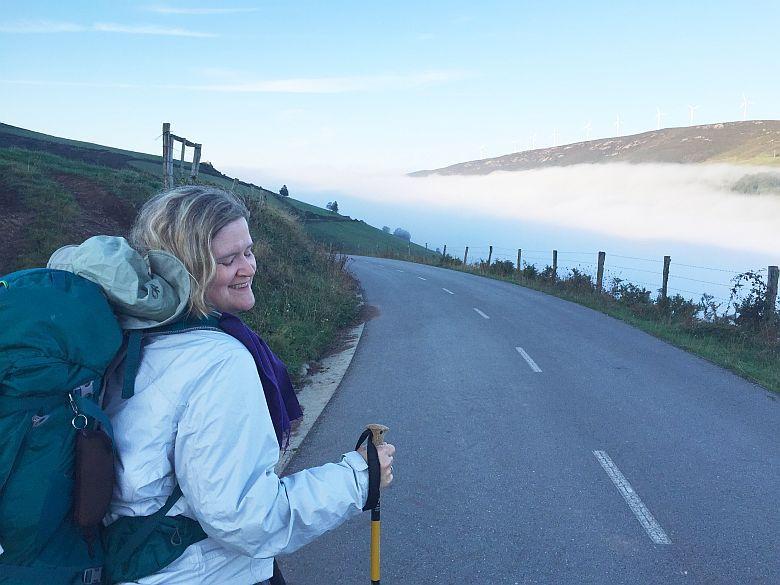
Entre una cosa y otra, había tenido ocasión de conocer a Tara Ramsey. Me la encontré en la aldea de Premoñu, aunque no intercambiamos más que un breve saludo de cortesía, y nos juntamos definitivamente unos kilómetros después, en los aledaños de Puerna. Fue entonces cuando supe que era norteamericana, que había llegado desde Washington DC para embarcarse en soledad en el Camino Primitivo y que acababa de abrir un blog en el que pensaba dejar constancia de su aventura, en parte para llevar una especie de diario personal y en parte para que su madre, que había quedado preocupada en la orilla americana del Atlántico, pudiera ir siguiendo sus andanzas.</
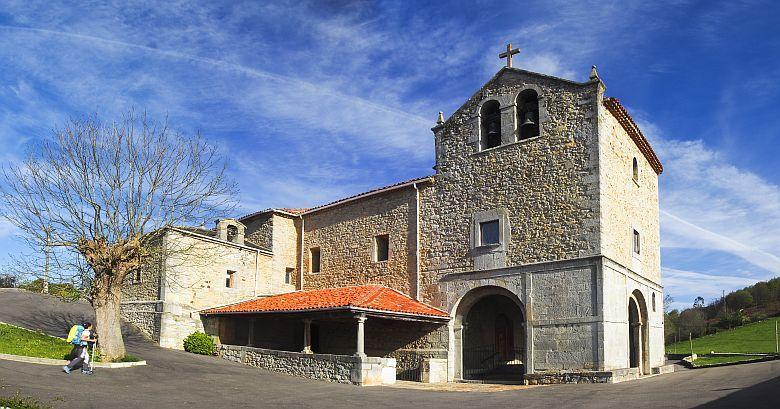
Rubén y Tara fueron, durante muchas etapas, mis compañeros más constantes en el Camino. Echábamos a andar juntos y, aunque pronto nos dispersábamos, los reencuentros al final de cada jornada no tardaron en convertirse en costumbre. Nos perdimos definitivamente de vista en Grandas de Salime. Rubén y ella se alojaron en el hotel instalado a la vera de la presa y yo preferí concluir en el pueblo. Para entonces, ya se habían sumado a nuestro grupo María José y Raquel, dos chicas de Murcia que habían comenzado la andadura en Tineo y a las que conocí en Pola de Allande, cuando la ruta me hizo detenerme allí en plenas fiestas del Avellano.
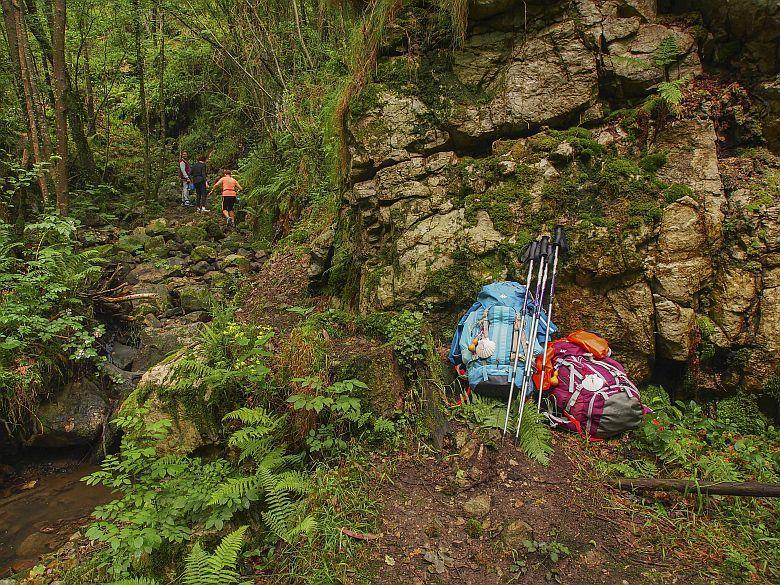
Puede parecer un inventario caótico, pero eso forma parte de la esencia del Camino. En alguna parte escribí que el curso de los itinerarios jacobeos se parece mucho al de la vida. Cuando se empieza, uno no es nadie, apenas una figura anónima que, con la mochila a la espalda, se suma a un mar de gente que avanza en dirección al oeste. Poco a poco, va conociendo a gente con la que mantendrá relaciones desiguales: con algunas personas compartirá largas caminatas, con otras se verá y dejará de verse según le convenga al azar y las más serán sólo sombras borrosas, rostros y voces que se diluirán en la memoria al cabo del tiempo. La llegada al Obradoiro es el éxito, pero es también una pequeña muerte: no hay nada al otro lado; una vez allí, toca deshacer los pasos, regresar a las rutinas consabidas y, en muchos casos, perder el contacto con todos aquellos a los que conoció, esos que durante muchos días se convirtieron en un punto de apoyo inexcusable a la hora de salir adelante.
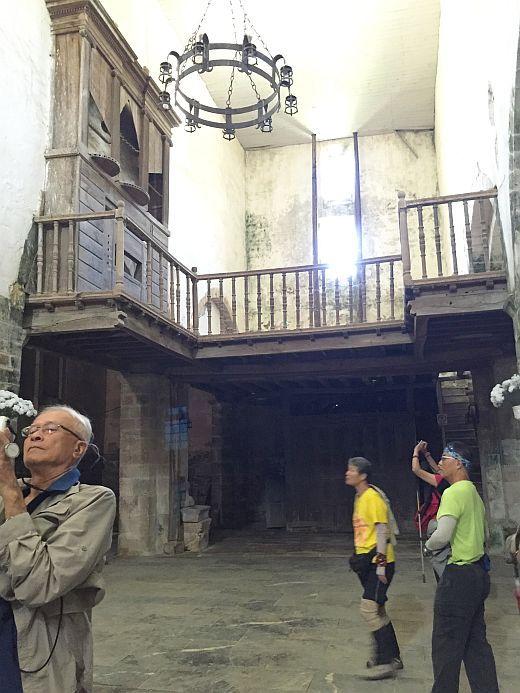
Han pasado varios años desde que anduve por el Camino Primitivo y el inventario de ausencias es grande. Nada volví a saber de los siete taiwaneses con los que coincidí en Tineo, y en Allande, y en Lugo, y a los que facilité la entrada en el monasterio de Obona, en una de las experiencias más pintorescas que me deparó la peregrinación a Compostela.

Tampoco sé nada de la suerte que corrió el matrimonio australiano con el que estuve conversando por un tramo del suroccidente asturiano y que andaban acortando las etapas en la medida de sus posibilidades, porque tenían ya una edad y las fuerzas no les daban para mucho. Alguna vez me detuve a charlar con otra pareja, esta italiana, que parecía sumida en una crisis incurable. Había un peregrino catalán, Santiago, que caminaba solo por voluntad propia y nunca intimaba mucho con nadie. Me cayó bien desde el principio y accedió a tomar una cerveza conmigo la última vez que coincidimos, en la Plaza Mayor de Lugo. «Quiero saber que puedo hacer esto solo», dijo antes de que nos despidiésemos al pie de las murallas de la capital gallega.
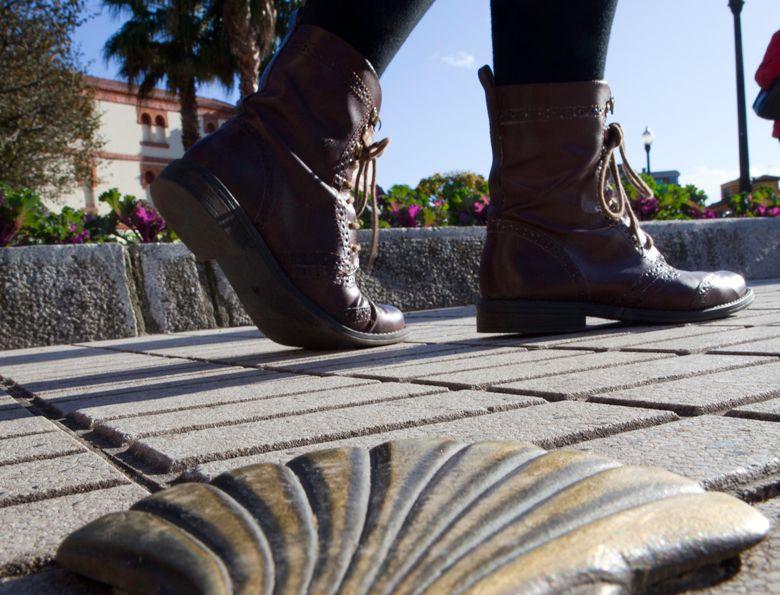
Sí he vuelto a saber algo de quienes con más recurrencia acompasaban sus pasos a los míos. Rubén me escribe cada cierto tiempo desde México para mandarme abrazos. Cada vez está más cerca de los ochenta, pero sigue soñando con la posibilidad de volar algún día a España para embarcarse una vez más en el Camino. También con Tara me intercambio mensajes de vez en cuando. Sé que tiene una perra que se llama Dora y también que vive con cierta inquietud los cambios del convulso panorama político estadounidense. A través del Facebook me llegan de cuando en cuando actualizaciones de Jorge, que coincidió conmigo entre San Román de Retorta y Ponte Ferreira y tuvo la gentileza de retardar su ritmo atlético cuando mi tobillo derecho se puso tonto y necesité de una mano amiga por si las cosas se ponían feas y tenía que acudir de urgencia a algún ambulatorio. Raquel y María José siguen por Murcia y hace un año volvieron a Galicia para hacer el Camino Francés, según me contaron ellas mismas. También me cuenta cosas Joe, que me escribe de tanto en cuando para compartir conmigo los planes que lo llevarán a surcar nuevos caminos por los parajes más insospechados. Es un caminante nato que tan pronto se pone a seguir las huellas de Santa Teresa de Jesús y sus sucesivas fundaciones como se extravía por parajes recónditos en los confines más agrestes del mundo. «Caminamos juntos», le dijo Rubén a una camarera que nos atendió en Campiello para explicar el vínculo que nos unía, y esa expresión resume mejor que ninguna otra las redes de complicidad de una odisea cuyas incertidumbres sólo se revelan ante aquellos que deciden iniciarla.
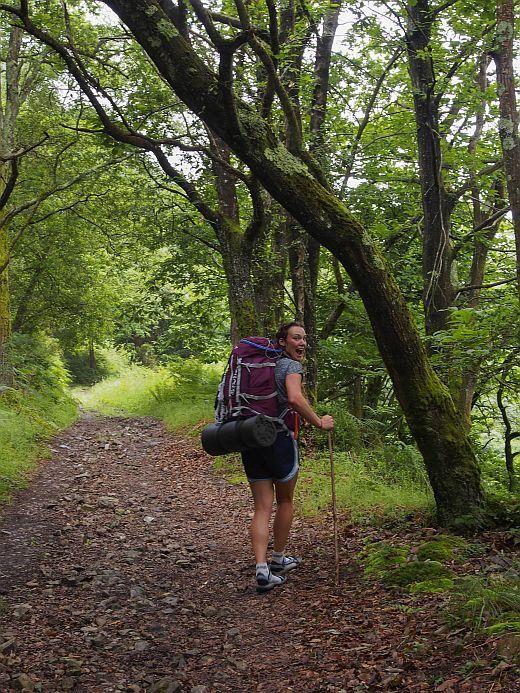
Por eso ir sabiendo que todos están bien, que mejor o peor siguen con sus vidas, que sigue habiendo algún Camino planeando por sus horizontes inminentes, es siempre reconfortante. «Nos veremos algún día, caminando», dijo Joe cuando nos separamos en las alturas del Monte do Gozo. Aunque siga pensando que lo más probable es que no volvamos a coincidir nunca, no puedo dejar de reconocer que me gustaría que sus palabras estuviesen acertadas, y que más pronto que tarde se acabe dando ese reencuentro.
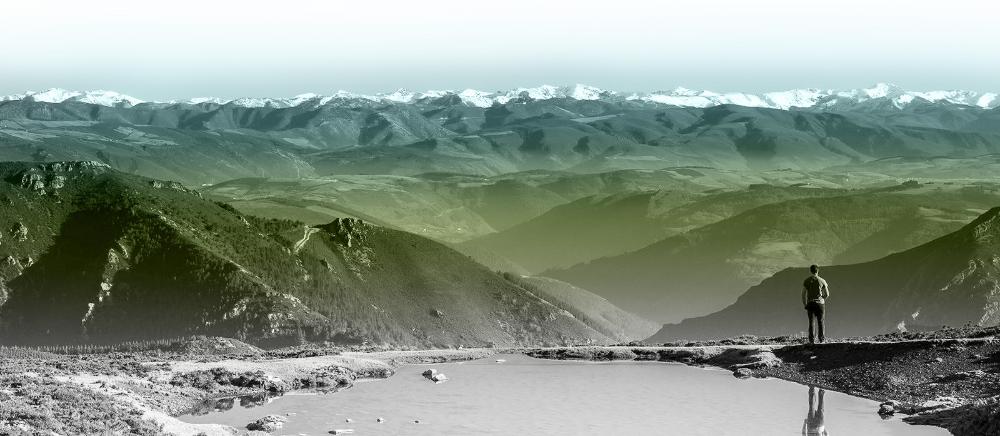
Suscríbete a nuestra newsletter y aprovéchate de ofertas, descuentos, y novedades
Suscribirse

